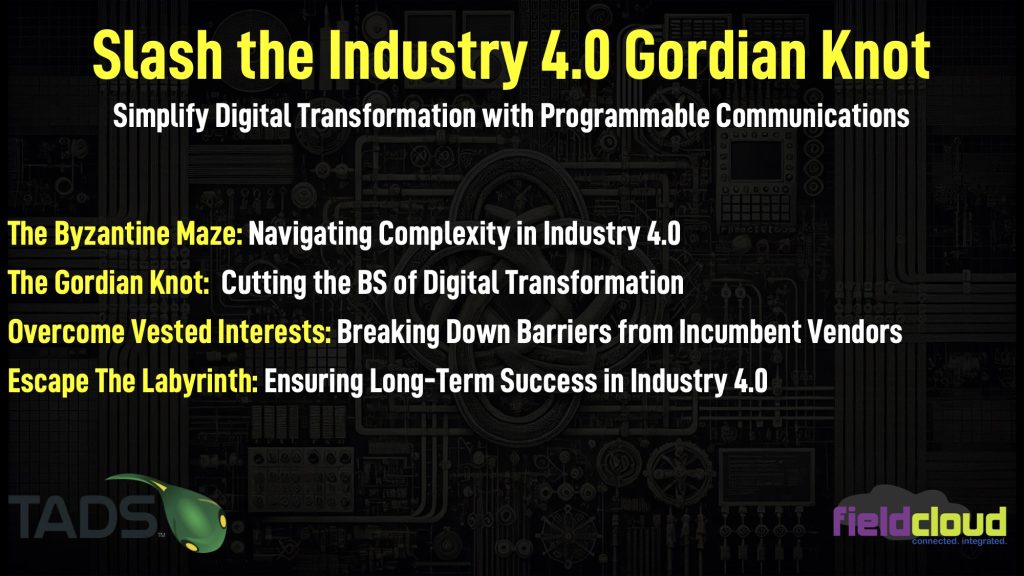In October Matthew will give a presentation on “Slash the Industry 4.0 Gordian Knot – Simplify Digital Transformation with Programmable Communications.” The subtitle is, “Simplify Digital Transformation with Programmable Communications.”
This session will cover:
- The Byzantine Maze: Navigating Complexity in Industry 4.0
- The Gordian Knot: Cutting the BS of Digital Transformation
- Overcome Vested Interests: Breaking Down Barriers from Incumbent Vendors
- Escape The Labyrinth: Ensuring Long-Term Success in Industry 4.0
The purpose of this podcast is to introduce Industry4.0, discuss some of the issues, and most importantly seek feedback of the TADS community on what Matthew should cover at TADSummit.
In Podcast 68 Matthew introduced Industry4.0.
Industry 4.0 has become a grab bag of trendy technologies, hopes and dreams. It’s in danger of going the same way as Digital Transformation, an overused term that means whatever you want it to mean. However, there are some core principles:
- Integration of Operations Technology (OT, automation) and Information Technology (IT, computerization) using data to create a real-time view of the company.
- A data strategy is critical to implementing Industry 4.0. Here Tesla and Amazon are used as leading examples of using data to accelerate production, insights, predictions, employee productivity, and customer focus. Here’s the link to the Walker Reynold’s presentation on Industry4.0 mentioned in the podcast.
- Matthew highlighted the importance of building on a solid foundation, and here is the danger of listening to the big vendor marketing. They’ll position buying their ERP (Enterprise Resource Planning) software as the answer. Tesla built its own platform, warp, as the existing solutions where inadequate. Warp is a real-time, collaborative, and synced operations for a seamless workflow across Tesla production and staff functions. Here’s a great video explaining warp.
On the warp video you’ll hear about the importance of customer feedback, in real-time, back into the organization. And this is a critical role programmable communications plays in Industry4.0. Part of the Data Strategy for every Industry 4.0 implementation should include vCon, the PDF for conversations. Every customer, partner, and internal conversation should be available as vCons to understand the customer experience, their expectations, and where the market is going. Customer feedback drives the production process.
In Podcast 74 with Thomas Howe and John Musser from Ford Pro we discussed Programmable Communications in the Automotive Industry.
Every vehicle that leaves Ford’s production line includes a wireless modem, customer feedback can be gather not just over the web and call center, feedback in the car can be recorded. Voice agents are critically important to avoid distracted driving, people are getting accustomed to using them. John shared how multiple agents can be used, this overlaps the discussions we had with Vladimir Beloborodov in Podcast 57.
The discussion moves onto all the workflows around maintaining uptime; including fleet management, service, parts, telematics, etc. The car, and the person driving it deliver many insights than need to be ingested. vCon enable the human part of that captured and combined will all the machine data. It was a fun discussion around how vCon can play a role in Ford Pro.
What Matthew is planning for TADSummit is to dive into the challenges facing Industry 4.0. Namely, complexity, legacy systems, and incumbent vendor interests. It sounds almost exactly like the telecoms industry.
Transformation is treated like an unsolvable problem (Gordian Knot) where yet another bandaid is applied instead, adding to the complexity. There are some important changes happening in Industry4.0, such as Unified Name Space (UNS). The principles of which are exception reporting and event driven architecture. Which delivers an instantaneous state of the business.
Matthew sees close analogies between Industry4.0 and Programmable Telecoms. The opportunity is not just in using aspects of programmable communications, such as vCon for customer / partner feedback, like Tesla’s warp. Rather a broader strategic comparison of how experiences in programmable communications can help Industry 4.0. For example programmable communication is like an abstraction of legacy telecom services, that can then be integrated into a variety of workflows.
UNS is about a manufacturing process having a complete current state of the business. While the events of customer feedback, as discussed in the Ford Pro discussion, are really external events. Industry4.0 is intensely focused on automation across manufacturing and production closed systems. Hence there will be some pushback from Industry4.0 folks that programmable comms is just external systems.
Back to the purpose of this session. What do you want Matthew to focus on? There is definitely an overlap between Industry4.0 and programmable communications. But what best meets you needs?
- Keep it simple, focus on the main applications of programmable communications to Industry4.0. For example, what should vCon include in its application ecosystem for Industry 4.0?
- Review Industry4.0 for a newbie. Explain what in your opinion Industry4.0 can learn from programmable telecoms.
- What can programmable communications can learn from Industry4.0.
- Please let Matthew know what you want him to cover.


One thought on “Podcast 79: TADSummit Innovators, Matthew Smith, TADSummit Presentation in Oct”
Comments are closed.